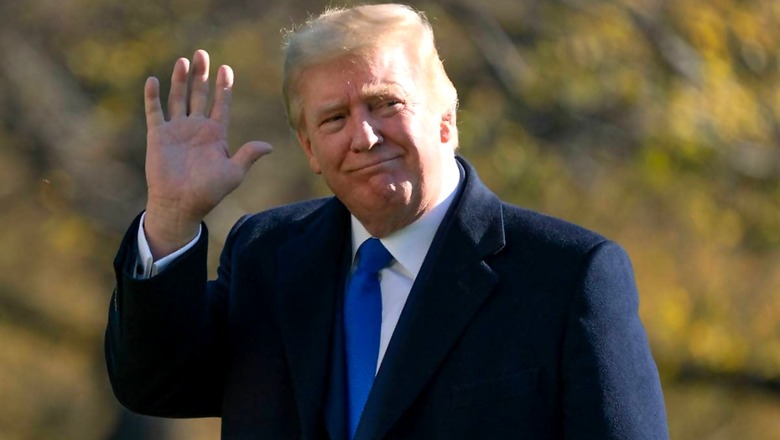
views
Donald Trump — who finds himself more and more isolated, with his quixotic quest to overturn Joe Biden’s election victory squashed at every turn — is openly musing about a second run at the US presidency in 2024.
“It’s been an amazing four years. We are trying to do another four years. Otherwise, I’ll see you in four years,” he told guests at a White House Christmas party on Tuesday.
The event, attended by several Republican Party power brokers, was closed to the media, but a video of the outgoing president’s speech quickly went public.
Nearly a month after the November 3 election the 74-year-old Trump still refuses to acknowledge that he lost and has not conceded to his Democratic rival, who is busy building his incoming administration.
Shuttered in the White House, Trump has limited his public appearances to the bare minimum but has not shied away from spewing furious tweets about alleged election fraud — which his own attorney general says is not evident.
“To date, we have not seen fraud on a scale that could have effected a different outcome in the election,” Bill Barr told the Associated Press on Tuesday.
Barr’s statement was all the more powerful because he is a staunch Trump ally.
Given the curious political climate, in which the president-elect is busy introducing his cabinet nominees while the current president spreads conspiracy theories, speculation in the nation’s capital is running wild.
According to NBC News, Trump has discussed the possibility with his close aides of launching his 2024 campaign on January 20 — Inauguration Day for Biden, which clearly the Republican does not plan to attend.
As he has admitted publicly in the past, the Manhattan real estate mogul-turned-president is a bit superstitious. In 2017, he filed the paperwork for his 2020 campaign on January 20, the same day he took the oath of office.
Trump loves nothing better than being a provocateur, and should he stage a rally to rival the pomp and circumstance of the inauguration, he would embrace one of his favorite political maneuvers: counter-programming.
Several times during his term, he boycotted the annual dinner hosted by the White House Correspondents Association — only to show up at a campaign rally the same night.
Obstacle course
The formal launch of a Trump 2024 campaign would allow him to stay center stage, at least in the short term. But his path to victory would be strewn with obstacles, to say the least.
From January 20, he will be the former president, and the political calculus will change dramatically.
The sway he holds over Republican lawmakers and the round-the-clock media attention he commands (and on which he thrives) will both taper off considerably.
All eyes will turn to his successor, but also to various senators and state governors within his own party who harbor White House ambitions.
As he has repeatedly said on Twitter, Trump did not suffer the collapse at the polls that some predicted, and can certainly boast of a significant political base.
The recounts roll on, but one thing is for sure: the 2020 election saw record turnout. Biden won more than 81 million votes, but Trump passed the 74 million mark — — the top two totals ever for presidential candidates.
On a nationwide basis by percentage, Trump — who incessantly mocks “losers” — doesn’t fare as well. He earned less than 47 percent of the ballots cast.
So will he end up being the Republican presidential nominee in four years?
That seems rather a long shot. Trump is hardly a traditional politician — he functions on instinct, in the moment. Long-term strategic planning is hardly his strong suit.
In theory, nothing is preventing him from trying again in four years. The US Constitution prevents anyone from serving more than two full terms in the White House, but non-consecutive terms are possible.
Only one president did so: Grover Cleveland, in the late 19th century.
Elected for the first time in 1884, his reelection bid was a failure in 1888, but four years later, he won again — making him both the 22nd and the 24th president of the United States.
Cleveland was 56 at the start of his second term. Trump would be 78 — the same age as Biden is now.
Read all the Latest News, Breaking News and Coronavirus News here

















Comments
0 comment